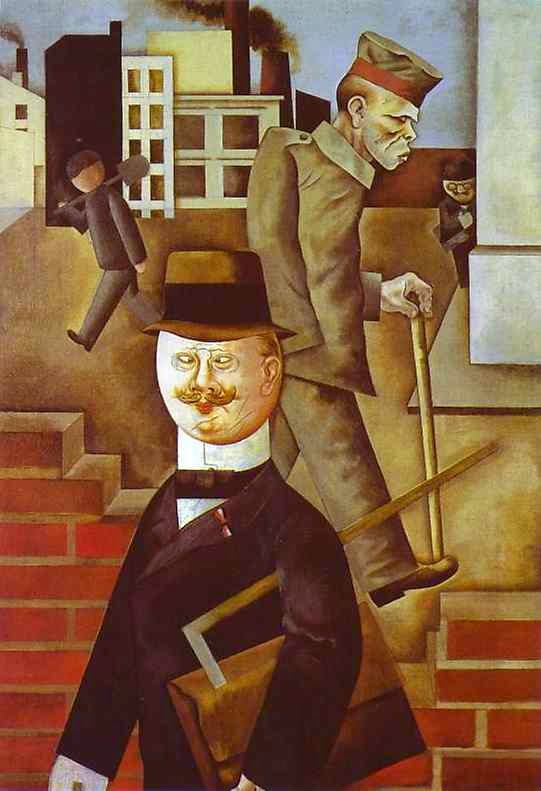Weimer Cabaret
"No Time" (Keine Zeit)
There may still be those who live unhurried lives
and don’t care about the hectic pace of these times.
Those who are not yet wildly obsessed
as they devour food from vending machines and make themselves sick.
However, in these frantic times, you meet few of these unhurried people.
Nowadays you stand at the vending machine,
with the token in your trembling paws.
You insert the coin, the tray revolves, and you take some bread.
Then you eat the roll at a frantic pace,
because hundreds of others are right behind you.
You chew and you chew without peace and rest
because there is a voice telling you:
"Insert token, take out bread,
for the food might soon be sold out."
One eats without finesse.
German translation:
Es soll noch Menschen geben,
die ganz gemuetlich leben und sich nicht kuemmern um das Tempo unserer Zeit.
Die noch nicht wild besessen aus Automaten fressen, bis ihnen uebel wird vor lauter Schnelligkeit.
Jedoch in diesen bewegten Zeiten, trifft man nur wenige von diesen Leuten.
Denn heut steht man im Schnellautomaten, mit der Marke im zittrigen Pfoetchen.
Oben steckt man sie rein und dann gibt’s einen Dreh, schon ist unten zum Vorschein ein Broetchen.
Und dann isst man das Broetchen in rasender Hast, denn es warten ja schon hundert andere und man kaut und man kaut, ohne Ruh ohne Rast, denn es sagt eine Stimme, der wandere.
Marke rein, Broetchen raus, schon ist dein Essen aus.
Man ist schnell ohne jede Finesse, der es schmeckt ist ganz ohne Fingresse.
Analysis and why:
** I chose this song at first because the the title appealed to me, and then upon reading the lyrics the whole song did. It is relatable to the present and also to Nihilism. Many can argue that the world we live in now sadly moves at the same pace. Everyone is so focused on the end result moving fast to reach their goals, to reach their possible "full potential," but have not yet slowed down to experience everything else. It is sad but true. Everyone is so used to moving at this pace they literally can not slow down; something might possibly go wrong and not the way it was planned.
The plan: finish high school, go to college, get a real job, get married and have kids. Where is the time to take a year off and experience the beauty in travelling, or just to reflect and learn about yourself? There is as the song says no time.
To be more specific the part that appeals to me the most is the line in which it says:
"Because there is a voice telling you
'Insert token, take out bread,
For the food might be soon be sold out.'"
This explains the way people move and act, like robots. Like I mentioned before the plan is the american dream that most of us have accepted and choose to go about that path, like robots going through the motions. This song brings about the problems with having no time for anything, it takes a nihilistic view on the world of Germany then, during a time of corruption of government and fearful people, to even now here in America.
"Chuck Out The Men," Friedrich Hollaeander, 1929
"Chuck all the men out of the Reichstag
and chuck all the men out of the courthouse
Men are the problem with humanity
they're blinded by their vanity
Women have passively embraced them
when we could have easily outpaced them
Yes we should have long ago replaced them
or better yet erased them
If we haven't made our feelings clear
we women have had it up to here."
"Es geht durch die ganze Historie
ein Ruf nach Emanzipation
vom Menschen bis zur Infusorie
überall will das Weib auf den Thron.
Vin Hawai-Neger bis zur Berliner Range
braust ein Ruf wie Donnerhall daher:
Was die Männer können, können wir schon lange
und vielleicht ’ne ganze Ecke mehr."
Analysis and why:
I chose the chorus of this triumphant song because although many can argue, many countries have come a long way with the role of women in society. This also relates to the lecture; we learned about leading ladies starring in films and the fear it had on men. Women during this time were so used to being oppressed as they grew stronger it was their time to express their feelings as they did during the Weimar Cabaret.
Paragraph 175 (Society - Homophobia)
A national prohibition, Paragraph 175, was added to the Reich Penal Code in 1871. It read:1
"An unnatural sex act committed between persons of male sex or by humans with animals is punishable by imprisonment; the loss of civil rights might also be imposed."
When the Nazi's came to power in 1933, they put a halt to efforts seeking reform of this law. In 1935, after the murder of Ernst Roem, the NSDAP amended the Paragraph 175 to close what were seen as loopholes in the current law.
Analysis:
When the Nazi's came to power in 1933, they put a halt to efforts seeking reform of this law. In 1935, after the murder of Ernst Roem, the NSDAP amended the Paragraph 175 to close what were seen as loopholes in the current law.
Paragraph 175 went through a more specific change when Nazi's came to power because their were loopholes in the previous law. What defines unnatural? What is meant by that. During the time of Nazi power, as mentioned in lectures there were many being oppressed. The women, who found their voice through things such as Weimar Cabaret as mentioned above and also homosexuality. There were fears associated with both and on the case of paragraph 175, the Nazi's wanted to put an end to it.







